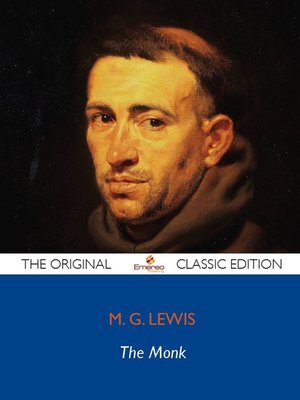The Monk - The Original Classic Edition
ebook

Sign up to save your library
With an OverDrive account, you can save your favorite libraries for at-a-glance information about availability. Find out more about OverDrive accounts.
Find this title in Libby, the library reading app by OverDrive.



Search for a digital library with this title
Title found at these libraries:
| Library Name | Distance |
|---|---|
| Loading... |
Matthew Lewis' "The Monk" is not a book you should read to little kids at bed-time. In the tradition of works like Walpole's "Castle of Otranto" and Radcliffe's "Mysteries of Udolpho," "The Monk" uses the established standards of the gothic romance, and takes them all to outrageous extremes. The novel explores themes of sexuality, violence, and sexual violence at great length. While some may find these play themselves out in a rather tame fashion by to-day's standards, consider that this novel was written and published in 1796 by a member of the British Parliament.
The title monastic is Ambrosio, who was abandoned by his parents as an infant. Raised in a monastery, Ambrosio is a religious fast-tracker taught to disdain sin and hold himself up as a model of purity, untempted by secular pleasure. In Madrid, as the novel begins, he is the young abbot, leader of a monastery. A mesmerizing public speaker, Ambrosio becomes proud and vain, as his popular weekly sermons quickly raise him to the status of an idol. Mischief and misfortunes ensue as Ambrosio's real virtues are put to the test.
What gradually appears to be nothing more than cheap melodramatic pornography is actually a sophisticated critique of the socio-political atmosphere of the late 18th century. "The Monk" operates as a critique not only of Roman Catholicism, but of religious fervor in general. The novel also has much to say about the nature of fame and hero-worship, making it relevant even to-day. "The Monk" also explores themes of government in general - showing the pros and cons of theocracy, oligarchy, pure democracy, and even questions matters of self-governance.
Without getting over-serious, I should also note that Lewis manages to sneak instances of humour into his gothic romance. "The Monk" is at times, a great deal of fun to read. It has all the requisite elements of a rainy-night novel - obscure legends, magic spells, terrible demons, chase scenes, and intersecting love stories. "The Monk" is a fantastic and engaging novel, and one which you will not soon forget after reading.







